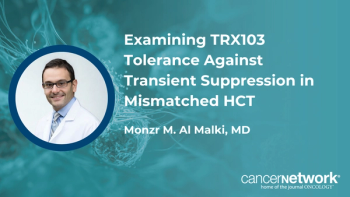
The Importance of Proactive End-of-Life Discussions in Oncology
Kelley A. Rone, DNP, RN, AGNP-c, highlights the importance of having end-of-life discussions early in a patient’s cancer treatment course.
Kelley A. Rone, DNP, RN, AGNP-c, spoke with CancerNetwork® about the challenges and strategies associated with end-of-life conversations and explored the need for proactive conversations in this space.
Rone, an advanced practice nurse in gastrointestinal cancer at the Mayo Clinic in Phoenix, Arizona, emphasized the need for physicians to acknowledge the potential limitations of treatment and to engage in open and honest discussions with patients about their prognosis. This strategy involves addressing the emotional and psychological impact of a terminal diagnosis and providing support for patients and their families as they navigate end-of-life care.
She also focused on barriers that may prevent physicians from initiating these conversations and offered potential solutions on how to overcome them.
Transcript:
We should all have [end-of-life] conversations. This is just my opinion: I think with the way our physicians are educated, they don’t spend a lot of time focusing on the fact that [their] treatment might fail. Maybe one of the difficulties is that a lot of physicians feel like, “Well, we should keep doing what we’re doing.” [This is] especially [true] in younger patients. We’re seeing more and more younger patients, and a lot of times the physicians will want to keep treating somebody because they’re young. “Well, we can’t quit now; they are so young.” Why do we need to [keep] younger people [on treatment] just because they’re young? If this scenario was occurring in someone who’s 78 vs 38 [years old], would you do the same thing for them?
Most of the oncologists that I work with are reasonably comfortable talking about this, but sometimes, it’s much more difficult for them based on the patient’s situation. I don’t know if you can make people okay with talking about death. Oncologists who are newer in the role may struggle with it a little bit more. As they become more seasoned, they become better at it. Some of the oncologists, though, are lovely, and I know they’re just not good at talking about death. With those oncologists, I [might say], “You should probably not have that conversation with the patient. I’ll take care of it.” If the patient is hearing it from all of us, that [the treatment] is not working, or this may not work at some point, then it’s much more easily accepted.
Newsletter
Stay up to date on recent advances in the multidisciplinary approach to cancer.










































